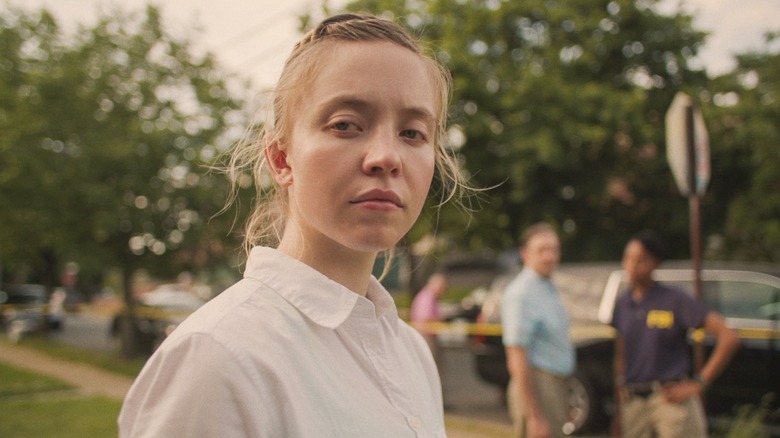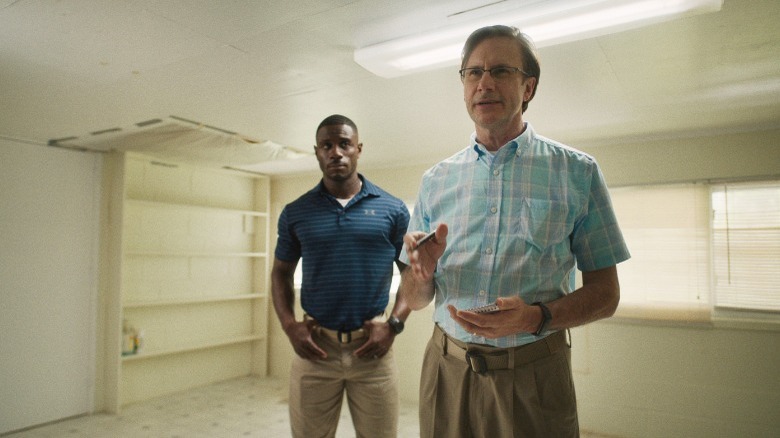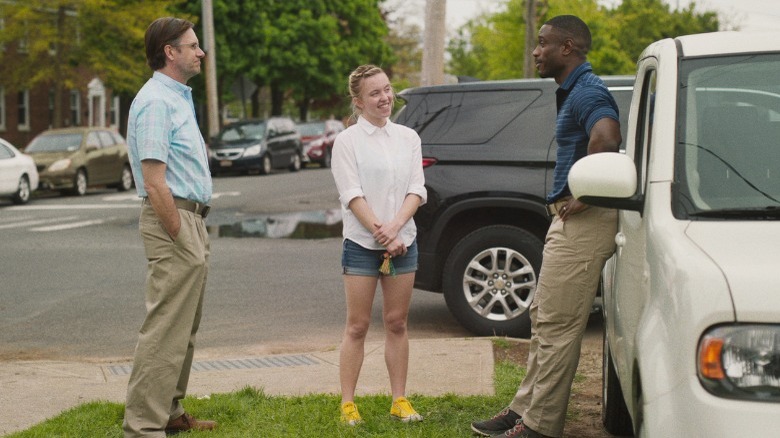Reality's Sydney Sweeney And Tina Satter On Visual Redaction, Subjectivity, And More [Exclusive Interview]
On a summer day in 2017, a woman was unloading her groceries when black SUVs suddenly rolled up to her home with FBI agents inside. A few hours later, the woman — NSA translator Reality Winner — would be arrested and sentenced to five years and three months in prison for leaking a classified document about Russian involvement in the 2016 election to the press. Before she was arrested, though, Reality went through a surreal questioning process, talking with agents about CrossFit, her dogs, and her work habits, including printing documents out on pretty paper.
It's these details that make up "Reality," a narrative-nonfiction hybrid film that's much more captivating — and harrowing — than its FBI-small-talk premise might indicate. The film, directed and co-written by playwright Tina Satter in her filmmaking debut, pulls its dialogue entirely from the real, redacted FBI transcripts from Winner's June 3, 2017 arrest. "Reality" doesn't quite unfold in real-time, but it comes close, ratcheting up the tension in Reality (Sydney Sweeney)'s conversation with two agents (Josh Hamilton and Marchánt Davis) while creatively incorporating documentary-like elements. An assured and powerful debut from Satter, "Reality" is anchored by what might be Sweeney's best performance yet.
Ahead of the film's Max debut, /Film spoke with Sweeney and Satter about the film's unsettling visual redactions, the workplace comedy they say could be made out of Winner's NSA days, and what it was like to adapt the story from Satter's own play, "Is This A Room."
Note: This interview has been lightly edited for clarity and brevity.
'What if we disappear the actors in those moments?'
I had a question for Tina first. So I loved all the techniques in this movie that were used to convey the discussion of classified information. Can you talk about how you landed on the idea of that visual redaction that we see in the movie?
Satter: Yeah, I mean, that was really exciting. It was almost like a mini art project within that part of the edit of thinking how do we treat — I knew I wanted to try to honor those redactions, which are literally in those parts of the transcript, which are then in the screenplay, and so was nervous and excited to get to that part of the work and had written in some gestures towards it into the script. But then, of course, we're really playing with that in post and in conversations with the wonderful editor Jennifer Vecchiarello, like this idea of what is a redaction? It connotes power and control and then something has disappeared. So it's like, "What if we disappear the actors in those moments?" So experimenting with that. And almost immediately, once we had even a rough idea of doing that, we were like, "Wow, it's really powerful."
Then, of course, the work: Those happen in really tense dynamic moments of the action, making sure we keep dealing that. So then all the finessing with the sonic and the sounds of those. And those glitches that are happening around them were another whole experimentation. They're actually degraded video of content that is actually related to what is being redacted, like news stories or other things. So they're a secret kind of layer because they're just blips.
But making this really specific package that had meaning to us and then also did something visually was really the goal of those redactions and how they worked on screen.
Yeah. It worked really well. I thought it was very eerie. Sydney, you've worked on some great projects with big casts and big sets like "The White Lotus" and I'm assuming "Madame Web." How did you approach filming "Reality" in such close quarters with a small cast differently?
Sweeney: I loved it. It's very intimate. And I've always believed that the eyes are the windows of soul and I loved what Tina did with the camera and just choosing those shots and being able to really show how intimate of a moment this was for Reality.
I read that you spoke with Reality ahead of filming. What were some of the important takeaways you had from those conversations with her?
Sweeney: How funny she is.
Satter: I know, she is funny, yeah.
Sweeney: She has such a funny sense of humor to herself, and that was one of the main takeaways.
'This is almost its own separate office comedy'
Tina, you initially staged Reality's story as a play. What were some of the challenges that came with adopting it for a new medium?
Satter: I mean, challenges that were really exciting because the way I staged the play was I knew I wanted no set and it was just these actors essentially get onto this platform that's beautifully lit and just say all the words. But I always was interested in it as a movie because I was like, "There's all these amazing details of Reality's life and the fact they were actually in her house that day." That's what I really was excited to get to show in the movie, and also bring in this subjectivity I had been interested in of what is it like for her to move through this particular afternoon, and then using close-ups and camera and all the choreography of Sydney and the other actors when we were in the room.
So those were the challenges, I think, but they were the very exciting challenges that I was chomping at the bit to get to finally bring to life.
I noticed how the camera sort of got closer as the tension was rising and we ended up with some really close shots of Sydney that were really great. Were you aware the whole time that it was almost like a three-act structure of the camera getting closer to you for a while there?
Sweeney: Was I aware? I mean, it was right in front of my face, so I was very aware that it was getting closer and closer. But, I mean, I had an idea, of course, because I'd see the frames and the shots, but how Tina edited it together, I got to watch it fully as a surprise, myself. So it was really amazing to see.
Were there any aspects of Reality's story that either of you came across during research that you wish you had been able to incorporate in the film but did not get to –
Satter: Well, one thing when I was talking to Reality — [looks at Sweeney] and I forget if you were on the call — I think it was me and the production designer or something. She told us about the people she worked with at the NSA and it was kind of ... because she's so funny, it was really funny. It was not necessarily what you expect the description of the NSA office workers and I was like, "Oh my God, this is almost its own separate office comedy: Reality at work at the NSA before she does this." But that was not the movie. But she's really funny when she describes her life. I think she comes across as sort of deprecating and dry, even in these intense moments of the movie. So every time you got to talk to Reality and hear more details, it was sort of...
Sweeney: You want to get more and more and more.
Satter: Yeah.
Sweeney: Definitely.
Satter: But I think we had our mandate, which was to stick close to this. That, in its own way, was so much work to do that and not to try to break that too much. So there's so much fascinating about her life and I think there always can be more content on a human, and we chose a very specific section of it, but it proved to be really rich for us to dive into that.
"Reality" is streaming now on Max (formerly HBO Max).


